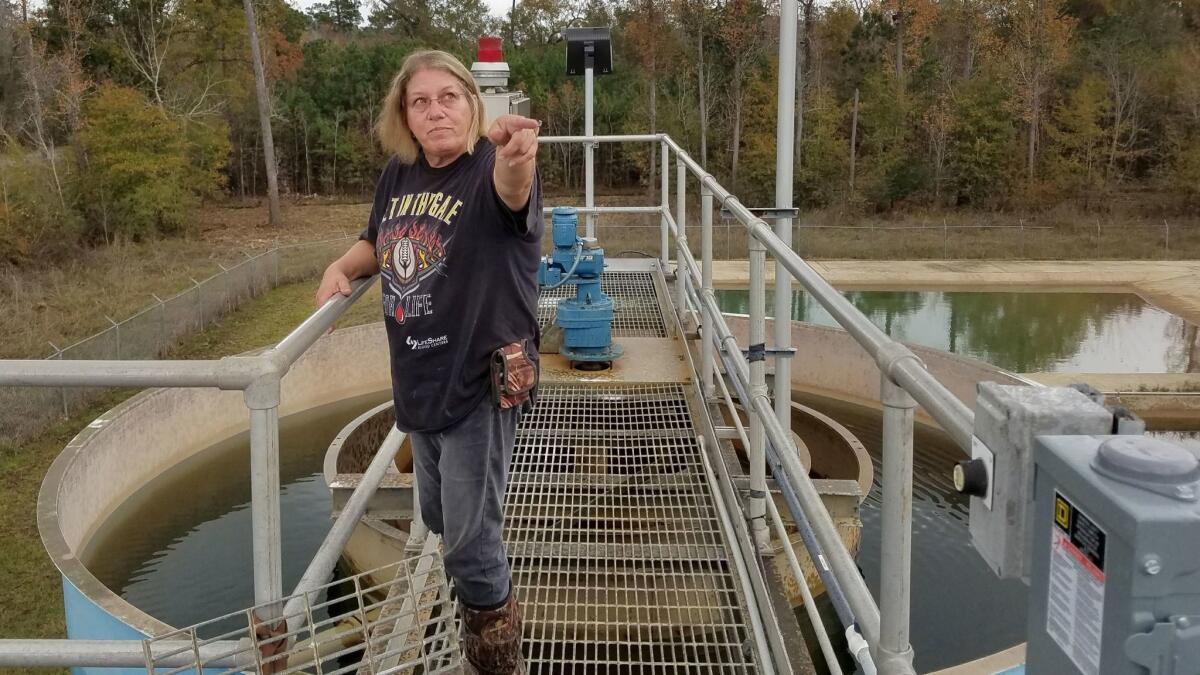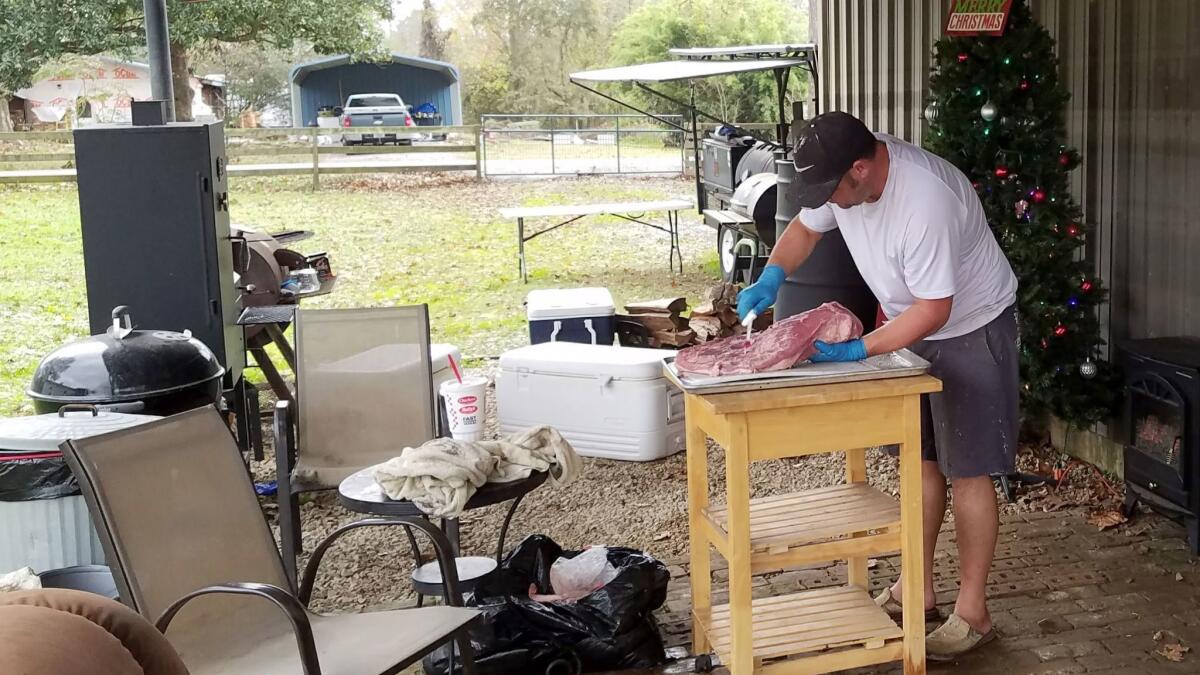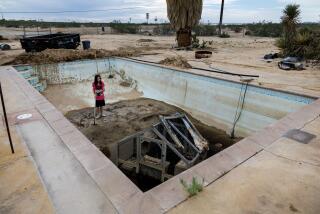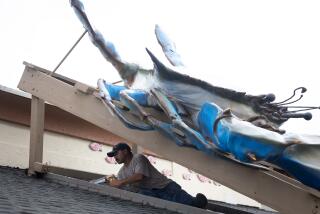Christmas wish for one hurricane-ravaged Texas town? Fresh water

Reporting from Rose City, Texas — It was before dawn when the woman responsible for running this small town’s water system got a frightening call: The water tower was running low.
Since Hurricane Harvey inundated this rural area 90 miles east of Houston with almost 10 feet of water in August, Janice Ratcliff has submitted drinking-water tests to the state, hoping to lift an order requiring nearly 600 residents to boil water. It would be a small step toward livability in Rose City, a town full of campers with Christmas trees set up outside.
She returned to her flooded office the week after the storm in waders, and kept the water plant operating manually, working seven days a week.
Before Thanksgiving, residents were among 3,750 people in southeast Texans without clean drinking water. The total was down to 1,150 people this week, state officials said. Rose City has supplied donated bottled water and hasn’t charged for tap water since the boil order was issued.
Ratcliff had hoped new tests would get the order lifted in time for the holidays. Insurance red tape and failed state tests had delayed the process before. Now a glitch had kept the water tower from filling overnight and threatened to set back the city’s plans.
At 5:15 a.m. Thursday, Ratcliff rushed to the tower above the town’s water plant behind City Hall, all still being rebuilt after the storm and surrounded by a mix of mud and debris.
Ratcliff’s own office had flooded, replaced by a wood shack without heat or air conditioning. To her relief, the tower still had enough water and pressure to avoid extending the boil water order. She gathered water samples and sent them off to the state, hoping for good news in the next 24 hours.
The first one she hoped to call with the good news would be Mayor Bonnie Stephenson.
Stephenson lost her own home in the flood, and has stayed three places since, most recently with her son in his double-wide trailer. After four years as mayor, the former union secretary and real estate agent found herself unloading trucks of donated supplies, coordinating relief centers including a military tent and temporary laundromat still set up in front of City Hall. She’s 72.
Some residents have received assistance from the Federal Emergency Management Agency, but many have not. FEMA is scheduled to hold a town hall meeting in Rose City on Jan. 4.
“Hopefully we’ll get some answers, or some help. I try my best, but sometimes it’s not enough when you’ve lost everything and you have people telling you, ‘What can I do?’ and you can only say, ‘Reapply,’ ” Stephenson said.
All but two of the 207 homes in Rose City were destroyed, she said. All across town, wood-frame homes sit vacant, broken windows dark and gaping, plastic toys salvaged from the flood lined up outside next to packed black trash bags.
“People are watching their homes rot,” the mayor said. “… It doesn’t seem like Christmas to us.”
There are no roses — the town was named after a nearby oilfield — but there are towering pines, the thick forest of east Texas mixed with the bayous of Louisiana, whose border is less than 25 miles away. Some homes were built in the 1800s, and families have lived here for generations.

Across the street from City Hall, City Secretary Tonya Veazey set up her Christmas tree under a carport serving as her family’s kitchen and den, with a couch, TV, smokers and a grill.
“I’ve had meltdown after meltdown. This past week has been the worst,” she said.
Neighbors know where she lives and come to the fence line looking for help — with the water, drywall and other building materials they cannot afford. Husband C.J. Veazey, 40, trimmed brisket on a table nearby to sell during the holiday.
“Because people didn’t have money for flood insurance, we’re rebuilding penny by penny, paycheck by paycheck,” said Tonya Veazey, 34, wearing a “Come Hell or High Water Texas Strong” T-shirt.
Volunteers came to help after the storm, including Los Angeles police and those who were flooded the year before outside Baton Rouge, La. Some volunteers remained at Rose City Baptist Church, where Veazey joined them Thursday sorting donated toys for children in town. The church was gutted, a tent of supplies and stained glass windows piled outside.
Up the road, Veazey had helped a couple get a donated camper to stay in while they elevated their house 10 feet. They didn’t have flood insurance, and it has cost them $16,000 so far just to raise the house.
Across the railroad tracks, an 86-year-old neighbor’s daughter tried to persuade her to leave after the storm destroyed her house and she had to be rescued by boat. When she refused to leave Rose City, the daughter returned from Dallas to help her rebuild, staying in a camper.
Juanita Cardenas recalled how she and her five siblings slept on the floor with their parents growing up, with cardboard for insulation. Back then, east Texas was segregated, which meant only her mother, the lightest-skinned in the family, was allowed into local shops. The Ku Klux Klan gathered nearby. When an African American man came to work up the road, a cross was burned on their corner.
But instead of moving away, most children — including hers — bought or settled the land, growing family plots.
“We survived,” Cardenas said.
Her four-bedroom house was razed after the flood, and the site is now a sandy lot. She got help building a one-room shack behind it with a kitchenette that Cardenas showed off. She hopes to move in after New Year’s.
“That’s a mansion to me growing up!” she said, laughing.
The family lost three houses on the plot, where Cardenas’ daughter also stays, and is still waiting for all of its FEMA assistance. They can’t afford to rebuild, but hope to find a larger trailer.
“I’m just thankful we’ve got something to live in,” said daughter Helen Ford, 59.
And on Friday morning, Ratcliff gave them something else to celebrate.
“Merry Christmas from the operators at the water plant in Rose City,” she announced on Facebook — the order to boil water had finally been lifted.
molly.hennessy-fiske@latimes.com
More to Read
Sign up for Essential California
The most important California stories and recommendations in your inbox every morning.
You may occasionally receive promotional content from the Los Angeles Times.










